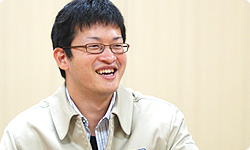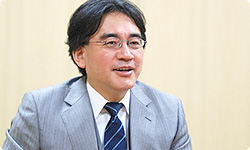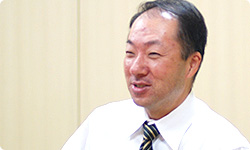2. Listening Over and Over
Nagamatsu-san, is there a song dear to you the way “Slider” is dear to Yokota-san?
If I were to choose one song from this CD, it would be the Ground Theme from Super Mario World . I remember playing it on the piano soon after I got into music. The fingers of your left and right hands move rapidly in an enjoyable way, so it was a fun song for me to play.
Did video games have something to do with you taking an interest in music?
Yes. They were quite important.
That’s because you were born as a part of the Famicom generation, right?
Even as a child, I really liked the music in video games, but I actually wanted to compose music for movies. As a student, however, people often told me that all the songs I wrote sounded right for video games, so I realised that video games must have had quite an influence on me.
This is a strange way of putting it, but you can blame Kondo-san for that.
(laughs)
No, I should thank him! (laughs)

I suppose that’s a better way of putting it! (laughs)
Nagamatsu-san, when did you first… Oops, I’m not supposed to be the one asking questions here. (laughs)
“Yokota Asks.” (laughs)
Sorry. (laughs)
No, go ahead!
Nagamatsu-san, I’m sort of interested to know how old you were when you first began to notice video game music.
When I was about 9 or 10. I started playing the Famicom when I was 2.
What? You can’t play when you’re only 2!
No, supposedly I was playing it quite a bit. When I was 2.
What year were you born?
In 1982.
You were born a year before the release of the Famicom. If you were two, that was the year after it came out. It was just starting to generate buzz. And when you were three, Super Mario came out.
Yeah. There was a time when hotels had Super Mario Bros. in them*. I would play it and people would gather around to watch. (*Many hotels in Japan at the time had Super Mario Bros. in the games room)
Is that because you were so good?
Yeah. Because I was playing all the time.
How old were you then?
I think I was about 4 or 5.
About 4 or 5. Even at that age you were a gamer whom people would gather to watch? (laughs)
Yeah. (laughs)
People gathered to watch you play Super Mario when you were 5, and when you were 10 you started thinking about how game music is made.
Yeah. I wanted to play the Ground Theme from Super Mario, but it’s really hard to play on the piano. I learned piano on my own, so I would play by ear. But I couldn’t quite pick up on the notes for the Ground Theme because the key changes a lot. The first one I could copy by ear was a song from Super Mario World. That's why I really like it, and I have a great time playing it.
If it hadn’t been fun when you played it, you might not be sitting here today.
Maybe not. (laughs) I still play it a lot.
I play it a lot, too. I think anyone who does the work we do learn to play by ear the songs they like. When you hear a song you really like, you want to play it in your own way, even if only in part.
And just like that, people like you two, Yokota-san and Nagamatsu-san, learn how to play video game music on their own and eventually become video game composers themselves. And when someone even younger hears your music, they too will follow those footsteps to enter this world.
That would be great. But when it comes to the work I’m doing, it’s orchestral, so it’s a little difficult to copy by ear.

I suppose it used to be easier because the Famicom didn’t have many sounds.
Yeah. The songs back then could only use three sounds at once. You could manage to do a pretty good copy with both hands. You could tell your friends that you could play the song from Mario, play it, and become a hero within a small circle of people.
Did you play it at school?
Yeah.
And everyone came to hear?
Yeah.
(clapping) “Yokota-kun*, that’s cooool!” *(*Like “san”, “kun” is an honorific that is used at the end of someone’s name. “Kun” is typically used when you call out someone who is younger than you, and is commonly used among classmates)
(laughs)
In elementary school, everyone liked it more if you played video game music on the piano rather than classical music.
I’ve heard something similar. A friend of mine who’s a little bit younger than I am graduated from a music university. During student teaching to become a music teacher, he played video game music for the students. They were intensely interested, and the distance between them suddenly closed in.
I know exactly what you mean! (laughs)
When I was overseas once, I met a Japanese person who was travelling from country to country. He said that wherever he went, if he played the music from Mario, everyone would recognise it and was able to make friends because of it. I was really happy about that.

Wow… I suppose lots of people all around the world are listening to the music in Mario games all the time. When you play a video game, you listen to the music the whole time, because it repeats. Usually, no matter how much you like a song, if you just keep listening to it over and over again, you get sick of it.
Yeah.
Why is it okay with video game music?
It’s hard to put into words, but I try to make music that people can listen to over and over again without getting sick of. Then when I think I’m finished, I do this… (closing his eyes and leaning back in his chair) …and listen to it for hours on end. Sometimes I even dance to the rhythm.
Wow!
You just listen to it on repeat for hours.
Yes.
So when you can listen to it for hours, it’s done as far as you’re concerned.
Right. And when I can’t do that, I know there must be something wrong with it.
